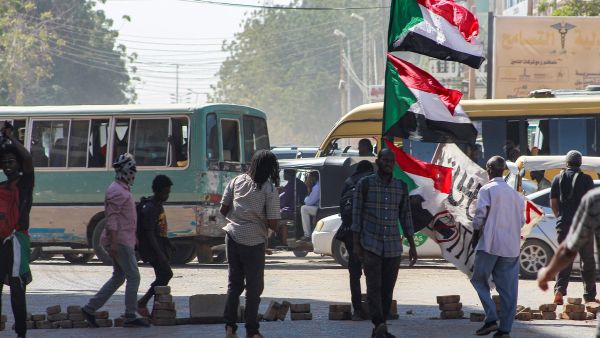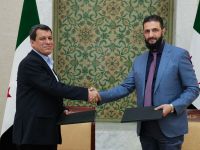ALBAWABA - Tens of protestors rallied in the Sudanese capital Khartoum against normal ties with Israel.
Normalization of relations between Israel and the North African Arab nation is expected to be in the form of signing an agreement that would end the formal state of animosity between the two countries. The agreement is expected to be signed in Washington at the end of the year.
Although Israel is signing bilateral peace accords with its Arab neighbors, many people across the Arab world still regard Israel as an enemy bent on swallowing more Palestinian land in the West Bank, confiscating Muslim shrines in Jerusalem and controlling Arab oil wealth.
Dozens of Sudanese rallied in Khartoum to oppose normalization with Israeli occupation and to protest against Israeli Foreign Minister's visit to the country. pic.twitter.com/LirF1yyQgL
— Palestine Electronic Forces (@PEFMISSIONS) February 5, 2023
Khartoum's protests followed Israeli Foreign Minister Eli Cohen's visit, heading a government and business delegation on the first official and high profile trip to Sudan on Thursday. Cohen met with the head of the Sovereign Council, army chief Abdel Fattah al-Burhan, and other top Sudanese officials, setting the stage for signing the agreement on the way to establishing diplomatic relations between the two countries.
Sudanese parties have expressed their rejection of Sudan's government's move forward towards normalizing relations with 'Israel', as the country's leader met last Thursday with Israeli Foreign Minister Eli Cohen in Khartoum to discuss reaching a normalization agreement. pic.twitter.com/KxUMgEQpTO
— Palestine Responds (@PalestineRespon) February 4, 2023
Many Sudanese are sympathetic to the Palestinians and, like other Arabs, reject normal ties with Israel before it relinquishes all war-won Palestinian lands.
In the protests, some demonstrators waved banners, which read: "Palestine is not for sale," while another beamed: "normalization is treachery," and a third screamed: "Jerusalem is not for sale."
عقب زيارة وزير خارجية الاحتلال للخرطوم.. سودانيون يحتجون ضد التطبيع https://t.co/PzzsDphy6Y
— شبكة قدس الإخبارية (@qudsn) February 5, 2023
The influential opposition People's Movement announced on Sunday that it rejected normalization of relations with Israel because of its persisting occupation of Palestinian land, noting that "the right to normalization is decided by the civil government and the Legislative Council, and it is the only way to sustain any foreign relations."
The statement said: "The issue of normalization with Israel requires a national dialogue that puts Sudan's supreme interests above all interests."







